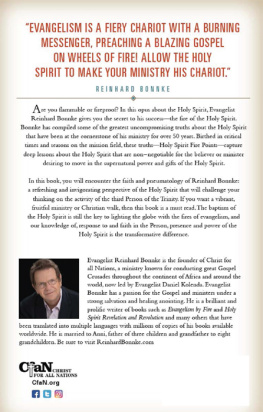In The School of The Holy Spirit
Jacques Philippe
Translated by Helena Scott
Scepter Publishers, Inc.
www.scepterpublishers.org
Originally published as A lcole de LEsprit Saint
Copyright 2002, Editions des Beatitudes, S.C.C.
Burtin, France
Scripture texts from the New and Old Testaments are taken from The Holy Bible Revised Standard Version Catholic Edition, 1965 and 1966 by the Division of Christian Education of the National Council of the Churches of Christ in the United States. All rights reserved. All copyrighted material is used by permission of the copyright owner. No part of it may be reproduced without permission in writing from the copyright owner.
English translation copyright 2007,
Scepter Publishers, Inc.
P.O. Box 211, New York, N.Y. 10018
www.scepterpublishers.org
All rights reserved.
Translation of texts on the back cover are by Sofia Cabrera
This edition is for sale in all countries except the Philippines and in Africa.
ISBN-13: 978-1-59417-053-9
ISBN-10: 1-59417-053-3
eBook ISBN: 978-1-59417-095-9
PRINTED IN THE UNITED STATES OF AMERICA
Contents
My Jesus, it is truly easy to become holy; it just takes a little good will! And if He finds this minimum of good will in a soul, He quickly gives Himself to her. And nothing can stop Him, neither our faults nor our falls, absolutely nothing. Jesus hurries to help that soul; and if the soul is faithful to this grace from God, she can in a short time reach the highest level of holiness that a created being can attain here below. God is very generous and does not refuse His grace to anyone. He gives even more than we ask for. The shortest road is faithfulness to the inspirations of the Holy Spirit.
This beautiful text is taken from the diary of St. Faustina. Even though it is simple and concise, it delivers an extremely important message for people who aspire to holinessto people who want to respond as far as possible to Gods love.
The major question for such souls, a question that sometimes causes them pain, is to know what to do about this message.
Maybe you never have been particularly concerned about this question. Maybe you never have aspired to love God as much as he possibly can be loved. If not, I ask that you now beg the Holy Spirit to put that desire in you, and even that you beg him to leave you restless until you have that aspiration. Then you will be really happy; for as our Lord said: Blessed are those who hunger and thirst for righteousness, for they shall be satisfied!
For those who aspire to the fullness of love, every suggestion that shows them a clearer or quicker way to that goal is extremely valuable. Almost nobody realizes it, but in my opinion it is just as important to help devout people become even holierand fasteras it is to help sinners be converted. It benefits the Church just as much. The world will be saved by the prayers of the saints.
This is why it is very important, even if not everyone understands, to pass on the best parts of the saints messages to todays Christians in order to help them progress faster toward the perfection of love.
The key question in this process may be our not knowing where to focus our efforts. The answer isnt always apparent, nor is it what we might suppose at the outset.
St. Faustina, in the passage quoted above and also in some of the other reflections in her Diary , gives us an indication from her own experience that is worth paying attention to: the shortest way to holiness is faithfulness to the inspirations of the Holy Spirit . So, rather than scattering our efforts in areas of our lives where they might turn out to be sterile or unproductive, Sister Faustina proposes that we center them on this point: be alert to recognize, welcome, and put into practice the inspirations of the Holy Spirit. Faithfulness to such inspiration is by far the most profitable course.
Lets first consider why this is, and then try to see exactly what is involved.
I
There is a widespread but mistaken idea that holiness is the work of human beings: that what we need is to have a clear program of perfection, set to work with courage and patience, and achieve it little by little. And thats all there is to it.
Unfortunately (or fortunately!) there is much more to it than that. It does take courage and patience, undoubtedly. But it is certainly not true that holiness is the result of a program of life we set ourselves. There are several reasons why holiness is not the work of human beings; here are two main ones.
It is impossible to attain holiness by our own power. The whole of Scripture teaches us that it can only be the fruit of Gods grace. Jesus tells us: Apart from me, you can do nothing. The saints themselves witness to this. This is what St. Louis Grignon de Montfort says, speaking of this sanctification that is Gods plan for us:
What an admirable work: dust changed into light, filth into purity, sin into holiness, the creature into the Creator, and man into God! Admirable work, I repeat, but a work that is difficult in itself, and impossible for unaided nature! Only God, by his graceabundant, extraordinary gracecan accomplish it; and the creation of the whole universe is not such a surpassing masterpiece as this.
However great our efforts, we cannot change ourselves. Only God can get to the bottom of our defects, and our limitations in the field of love; only he has sufficient mastery over our hearts for that. If we realize that we will save ourselves a great deal of discouragement and fruitless struggle. We do not have to become saints by our own power; we have to learn how to let God make us into saints.
That does not mean, of course, that we dont have to make any effort; but if our efforts are not to remain fruitless, they must be directed to the right end. We should fight, not to attain holiness as a result of our own efforts, but to let God act in us without our putting up any resistance against him; we should fight to open ourselves as fully as possible to his grace, which sanctifies us.
This opening of ourselves demands a great deal of humility because it means renouncing our tendency, born of pride, to want to manage by ourselves; it means accepting our own poverty and so on. But at the same time it is very encouraging.
The reason it is encouraging is that our own powers are limited, but Gods power and love are not. And we unfailingly can obtain the help of that power and love for our weakness. All we have to do is peacefully recognize and admit the fact of our weakness, and place all our trust and hope in God alone. Basically, its very simple; but like all simple things it takes years for us to understand and, above all, to practice.
The secret of holiness could be described as discovering that we can obtain everything from God, on condition that we know how to get hold of him. That is the secret of St. Thrse of Lisieuxs little way: God has a fathers heart, and we can unfailingly obtain what we need from him, if we know how to take him by the heart. Here is a passage from a letter by St. Thrse of Lisieux that can help us to understand what this means:
I want to try to make you understand, by a very simple comparison, how much Jesus loves those souls, even imperfect ones, who entrust themselves to Him. Imagine that a father has two children who have been naughty and disobedient; and that when he comes to punish them, he sees one who trembles and runs away from him in terror, knowing in his heart that he deserves to be punished; and that his brother, instead, throws himself into his fathers arms, telling him that hes sorry he has displeased him, he loves him, and to prove it he will be good from now on. Now if that child asks his father to punish him with a kiss, I believe that the happy fathers heart will not be able to resist his sons filial trust, since he knows his sincerity and love. Yet he also knows that his son will fall into the same faults again, but he is always ready to forgive him if his son always appeals to his heart.
Next page
















